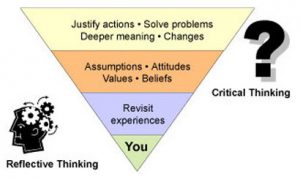“It is not sufficient to have an experience in order to learn. Without reflecting on this experience it may quickly be forgotten, or its learning potential lost.” (Gibbs, 1988:9)
What is it?
Reflection is a natural human thought process involving memory, analysis and future predictions and goal setting (Boud and Walker 1997). Reflective writing is a more formal and structured expression of that process. Reflective writing is a common feature of many disciplines and professions such as nursing, management, education and medicine; therefore, is often summatively assessed in these courses. However, reflection has a place in all modules because it is key to learning. It can serve as a formative assessment tool to help students develop autonomy and direct their own learning processes. Mezirow (1991) states that reflective thinking becomes critical thinking when it is a more careful and formalised process of writing.

image taken from https://student.unsw.edu.au/reflective-writing
Why would I use it?
- It is the first step to developing critical thinking and analytical skills through examining assumptions, beliefs and knowledge (Mezirow, 1991).
- Reflecting on experiences, for example of critical incidents on placements or of the transition from high school to university can be a way of dealing with challenges which might otherwise have been internalised and caused stress.
- It builds confidence in students by identifying strengths and reinforces the growth mindset (Dweck, 2013) through identifying areas for development rather than inherent weaknesses.
- It builds knowledge and awareness of other genres of writing and means of disciplinary knowledge creation through reflection on action or experience (Kolb, 2013; Schon, 1993).
Known issues:
- Reflection can easily become a hoop-jumping exercise, especially when summatively assessed. Students may be less likely to be honest and self-critical if they feel they are being judged on aspects of their personality or emotions. Mantle (2017) calls into question the ‘right’ of educators to formally assess a deeply personal process in which students discover themselves and the world around them.
- It is important to set meaningful tasks that students can engage with critically. In other words, students must be given something to reflect ON.
- Students may not be used to the personal narrative style of reflective writing or treat it as descriptive diary writing exercise rather than a legitimate academic genre.
How has it been used?
The most common method of reflection is through journals, which can be completed on paper or online. Reflection can also take place through the medium of presentations, blogs or videos. The basic structure of reflective writing involves a three step process:
- Description of the task/incident/performance
- Interpretation, or analysis of what went well, what not so well, what could have been done better. This includes what was learned and comparison to other incidents/tasks etc.
- Outcomes, or implications of what was learned. This includes how the experiences feeds into future learning and may involve goal-setting.
In management and business courses, students who work in groups are often given roles and responsibilities based on organisational theories such as Kolb’s experiential learning styles theory or Gibb’s reflective cycle. Part of the assessment involves an individual reflection on the student’s team work and performance in the task using the learning styles and roles theory (and accommodating its critics).
- Students can be asked to reflect on a performance, for example in a lab or OSCE.
- Reflection can be used as part of a portfolio (see this resource) or the portfolio could be a reflection in itself.
- Reflection can take place in-class or online through small tasks to be completed throughout the module.
- Griffiths and Freeman from the University of Sheffield provide an example of assessed reflection in clinical practice
- See Case studies in this resource for an example of a reflective writing assessment from BSc Psychology in KCL’s IOPPN.
